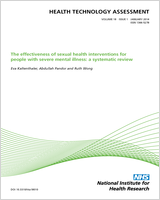Included under terms of UK Non-commercial Government License.
NCBI Bookshelf. A service of the National Library of Medicine, National Institutes of Health.
Westwood M, van Asselt T, Ramaekers B, et al. KRAS mutation testing of tumours in adults with metastatic colorectal cancer: a systematic review and cost-effectiveness analysis. Southampton (UK): NIHR Journals Library; 2014 Oct. (Health Technology Assessment, No. 18.62.)

KRAS mutation testing of tumours in adults with metastatic colorectal cancer: a systematic review and cost-effectiveness analysis.
Show detailsThe overall objective of this project was to summarise the evidence on the clinical effectiveness and cost-effectiveness of Kirsten rat sarcoma viral oncogene (KRAS) mutation tests (commercial or in-house) for the differentiation of adults with metastatic colorectal cancer (mCRC) whose metastases are confined to the liver and are unresectable and who may benefit from first-line treatment with cetuximab in combination with standard chemotherapy from those who should receive standard chemotherapy alone, as recommended in the National Institute for Health and Care Excellence (NICE) technology appraisal TA176.1 To address clinical effectiveness, data on the clinical validity of the different KRAS mutation tests (sensitivity/specificity for detection of mutations known to be linked to insensitivity to cetuximab) are required. Because methods of testing KRAS mutation status differ in terms of both the mutations targeted and the limit of detection (the lowest proportion of tumour cells with a mutation that can be detected), the definitions of KRAS mutant and KRAS wild type vary according to which test is used. All testing methods are essentially reference standard methods for classifying mutation status, as defined by the specific test characteristics, and it is therefore not useful to select any particular test as the reference standard. In addition, the relationship between insensitivity to cetuximab and the presence of specific mutations or combinations of mutations, as well as the relationship between insensitivity to cetuximab and the level of mutation present, are uncertain. Therefore, the following research questions were formulated to address the review objectives:
- What is the technical performance of the different KRAS mutation tests {e.g. proportion of tumour cells needed, limit of detection [minimum percentage mutation detectable against a background of wild-type deoxyribonucleic acid (DNA)], failures, costs, turnaround time}?
- What is the accuracy (clinical validity) of KRAS mutation testing, using any test, for predicting response to treatment with cetuximab in combination with standard chemotherapy?
- How do clinical outcomes from treatment with cetuximab in combination with standard chemotherapy and, when reported, from treatment with standard chemotherapy alone vary according to which test is used to select patients for treatment?
- What is the cost-effectiveness of the use of the different KRAS mutation tests to decide between standard chemotherapy or cetuximab in combination with standard chemotherapy?
First-line chemotherapy of unresectable colorectal liver metastases seeks to achieve a tumour response such that the tumour is judged to be resectable. For this reason, resection rate is considered the ideal reference standard for question 2 and the optimal outcome measure for question 3.
- Objective - KRAS mutation testing of tumours in adults with metastatic colorecta...Objective - KRAS mutation testing of tumours in adults with metastatic colorectal cancer: a systematic review and cost-effectiveness analysis
- Data collection - The Asymptomatic Carotid Surgery Trial-2 (ACST-2): an ongoing ...Data collection - The Asymptomatic Carotid Surgery Trial-2 (ACST-2): an ongoing randomised controlled trial comparing carotid endarterectomy with carotid artery stenting to prevent stroke
- Standardisation of provider and contract referral - The relative clinical effect...Standardisation of provider and contract referral - The relative clinical effectiveness and cost-effectiveness of three contrasting approaches to partner notification for curable sexually transmitted infections: a cluster randomised trial in primary care
- Diagnostic accuracy of the Thessaly Test and other tests for diagnosis of menisc...Diagnostic accuracy of the Thessaly Test and other tests for diagnosis of meniscal tear - Diagnostic accuracy of the Thessaly test, standardised clinical history and other clinical examination tests (Apley’s, McMurray’s and joint line tenderness) for meniscal tears in comparison with magnetic resonance imaging diagnosis
- Drosophila arizonae strain 15081-1271.14 hypothetical protein (GI19546) gene, co...Drosophila arizonae strain 15081-1271.14 hypothetical protein (GI19546) gene, complete cdsgi|744515616|gb|KP236481.1|Nucleotide
Your browsing activity is empty.
Activity recording is turned off.
See more...